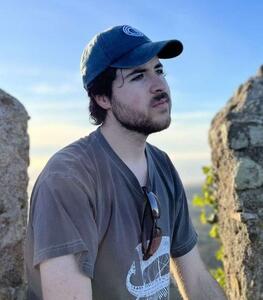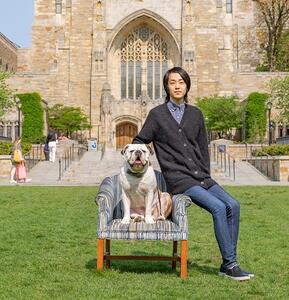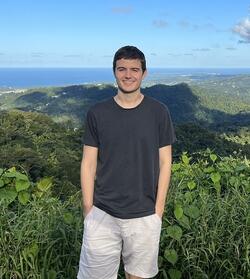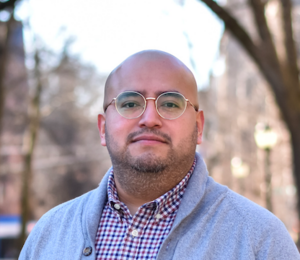Written by Miki and the prize recipients.
Allow me to share the Math department’s congratulations to all of our graduating seniors - we are so proud of you!
This year’s Math graduation party took place in the afternoon on Monday, May 22. We are thrilled that many of our seniors and their families were able to join us for the celebration. It was wonderful to see all of you.
During the event, we announced this year’s mathematics prizes , given out by Prof. Andrew Neitzke, and by Hamilton Wan (last year’s recipient of the Stanley prize). Per our tradition, each prize recipient shared an anecdote from their time at Yale.
For this article, they wrote a few lines about their plans, and shared advice for new math majors:
The DeForest prizes for proficiency in pure and applied mathematics are awarded to Ethan Pesikoff ‘23 and Wenrui Kong ‘23.

Ethan will be pursuing a MASt in Pure Mathematics at Cambridge next year before starting his PhD in math at the University of Chicago in fall 2024. During this summer, he looks forward to both his gig at Jane street and travelling abroad, which will likely include backpacking in the Austrian alps. Hopefully, he’ll find time in grad school to continue playing the piano and studying languages he likes.
Work with people (and if you can, befriend them)! There’s a time for solitary study, but doing stuff with people goes a long way for several reasons. Maybe even if you don’t understand something, your friends might, and they can clarify it for you in some more helpful way. And when you’re the one who gets it, explaining a concept can really help it stick and solidify in your mind. Math is pretty hard, so having people to collaborate with and complain to and feel stuck with goes a long way. The Anthony D. Stanley memorial prize, given out to a junior for excellence in pure and applied mathematics, is awarded to Erica Weiler ‘24. Erica will be doing an internship at Goldman Sachs in New York City this summer, and she is looking forward to spending time with her friends and family, as well as hopefully finding time to draw. Don’t be put off from doing the major just because you feel like you have less experience than your peers. Everyone comes from a different background and takes these classes at different points in their degree. I know from experience that sometimes it can feel like you are the only one struggling with a topic, or you may feel so lost that you don’t even know how to formulate the right question. At times like these (and, honestly, at all times), my main advice is to go to office hours, where you can meet other people in your class and, as cliché as it sounds, unite through your struggles. Chances are you will find someone who can guide you through that topic you had issues with, and whom you can then help with a different topic that you understood and they didn’t. The George Beckwith prize for proficiency in astronomy or mathematics is awarded to Jack Miller ‘24. Jack is excited by number theory, and is interested in pursuing this subject as well as adjacent fields of math in graduate school. This summer, he looks forward to making new friends in math, going on long hikes, and learning how to touch his toes. You don’t have to be inspired all the time by what you are learning, but I recommend circling back to the bigger picture as to why you are learning mathematics. The bigger picture is allowed to change, but I find it may help to create one and keep it in your mind for an extended period of time. Also, if you are taking a course in an upcoming semester, skim through wikipedia or a textbook on the subject and “play with” (read and try to come up with examples of) the basic definitions and philosophical issues that are presented. Most of all, have fun! The John Alan Lewis Summer Research Fellowship is awarded to a winning proposal by an undergraduate student majoring in mathematics who wishes to pursue their studies over the summer. This year’s fellowship is awarded to Rudy Cordero. Advice to new math majors

Advice to new math majors

Advice to new math majors

Advice to new math majors

Research proposal summary
Advice to new math majors